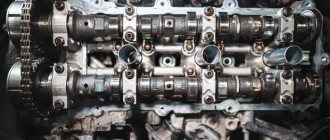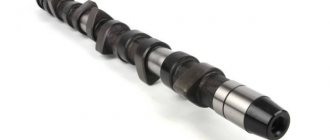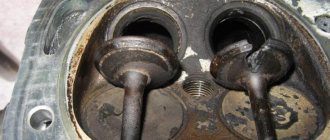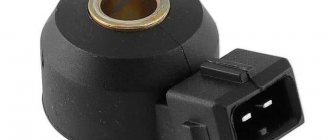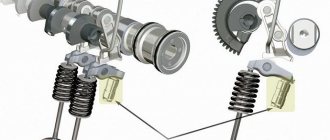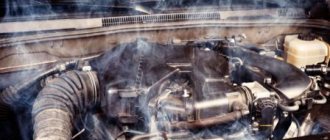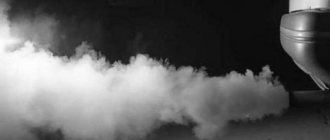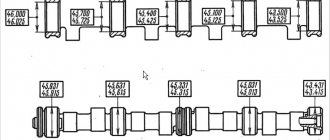Hydraulic compensators knock when hot
If hydraulic compensators knock only when the engine is hot, this may be caused by the following reasons:
- Dirty oil (due to infrequent changes or low-quality oil purchased). The solution is to check the oil, if it is dirty, then drain it, rinse it and fill it with new one.
- The valves are clogged. This problem is solved by washing and filling with good motor oil.
- The oil filter does not cope with its functions. A clogged oil filter does not create the required operating pressure in the oil system, which is why the oil does not reach the hydraulic compensators and an air lock is created. If the engine oil is clean, then simply replace the oil filter.
- The oil level on the dipstick is higher or lower than the specified norm. The solution is to drain or add oil.
- The oil pump is not working properly. The pump may be set to operate at less than full capacity. The solution is to investigate and adjust the pump's operation.
- The hydraulic compensator socket is enlarged when the engine is cooled down, and when the engine is warm it increases even more. The solution is to contact the service to create the required size for the compensator fit.
- There can be reasons for both the hydraulic part and the mechanical part. Without the appropriate skills, you may not be able to repair them yourself. The solution is to contact the service or invite a knowledgeable person.
Hydraulic compensators knock when cold
Below is a list of reasons typical for hydraulic compensators knocking on a cold engine:
- The hydraulic compensator itself has become unusable. To eliminate this cause with your own hands, you should dismantle them, wash them and disassemble them. Check for mechanical damage. Dirt may have gotten into the plunger system. The solution is to replace or repair if acceptable.
- The engine oil has become dirty and has coked solids. The solution is to flush the oil system and add new oil.
- The hydraulic valve does not work, so when the engine is just turned off, the oil flows down and an air lock is created instead of oil. Further, if you start the car, knocking noises will be heard at first, but as the engine warms up, the characteristic knocking noises will stop. The solution is to bleed the hydraulic compensator and replace the valve.
- The intake hole is clogged, which prevents the necessary oil circulation. The solution is to clean the hole.
- The engine oil is filled with oil, which becomes too thick at sub-zero temperatures. The solution is to fill in high-quality oil that retains its properties at different temperatures.
- The oil filter is clogged. The solution is if the engine oil itself in the engine is clean and transparent, then simply replace the filter.
Hydraulic compensators are knocking, is it possible to drive?
When there are knocking noises from the hydraulic lifters, you can drive, but this can lead to more expensive repairs than finding and eliminating the cause of the knocking.
Operating a vehicle with knocking hydraulic compensators will be accompanied by the following consequences:
- Reducing engine power.
- Uncomfortable driving in general. (Driving when something is knocking in the structure of the vehicle is not entirely pleasant for those who take care of their car).
- Increased level of environmental pollution.
- Excessive fuel consumption.
- Increased vibration.
Many people say that you can drive with tapping hydraulic compensators, but you need to understand that these parts are part of the engine design. And engine overhauls are much more expensive in both time and finances.
Why hydraulic compensators knock: reasons
Malfunctions may be in the hydraulic compensator mechanism itself or the oil supply system.
The first includes:
- The striking surface of the spring pair is worn.
- Presence of marriage.
- The oil supply valve may become clogged, causing it to stick.
- Presence of air in the hydraulic compensator device. This problem sometimes occurs due to a lack of oil.
- Carbon deposits on hydraulic compensator parts.
Secondary reasons include:
- There is air in the system or the oil level is lower than required.
- The oil supply system is clogged with carbon deposits.
- The oil filter has failed.
- Oil viscosity does not correspond to climatic conditions.
- Due to engine overheating.
Hydraulic compensators knock when hot , mainly due to poor quality or used engine oil. The solution is simple. Fill in a new one. The problem may also be a worn oil filter. Check it and if so, then it is best to replace it. If the problem persists, there is a problem with the engine components.
also knock when cold But the peculiarity lies in the viscosity of the oil. Because when heated, it changes its viscosity to a more liquid state. This is where the knocking of the hydraulic compensator lies. Therefore, you should not pay attention to the rougher operation of an engine that has just started.
Car services in Moscow for replacing hydraulic compensators:
The knocking of hydraulic compensators can appear in various situations: after starting a cold internal combustion engine or during idling, hydraulic compensators begin to knock on a hot engine, etc. It is quite obvious that for many car enthusiasts the question of what to do if the hydraulic lifters are knocking, what to do in this case, becomes relevant.
Let's start with the fact that the knocking noise of hydraulic compensators can be eliminated most effectively taking into account a clear understanding of the causes of the problem. For example, if hydraulic compensators knock on a cold engine, but the knock disappears some time after starting, then in many cases this is not a cause for serious concern. If, as it warms up, the extraneous sound does not go away, that is, the hydraulic lifters are knocking when hot, then the engine needs diagnostics. Next, we will talk about why the main valve knocking occurs, whether it is possible to drive if the hydraulic compensators are knocking, as well as how to determine the cause yourself and what measures can be taken.
Read in this article
Correcting the situation
It becomes very simple to finish what you started after identifying all possible causes:
- If the reason why the hydraulic compensators are knocking when cold is the products themselves, then they will have to be replaced simply.
- If there is an incorrect amount of oil, add it or, conversely, drain the excess.
- When clogged, the filter element is replaced.
- The same should be done if damage to the pumping equipment is detected.
If the car owner was unable to identify any obvious signs of such noise occurring when operating his car, then it is recommended to purchase and use higher quality oil. If this does not bring results, then there is only one way out - sending the vehicle to a good service station, where more experienced specialists will be able to select the “optimal treatment”.
Hydraulic compensators knock when cold
So, we’ve sorted out the main list of reasons. Now we can consider practical situations. As already mentioned, main valves can knock constantly or periodically. If the hydraulic compensators knock when starting the engine, and the engine is cold, but after warming up the knocking disappears, then extraneous sounds cannot be considered signs of a breakdown. It is quite natural that with mileage the engine oils have a certain depletion and a certain degree of contamination; unheated engine oil does not have the required viscosity immediately after starting. After the engine warms up, the clearances return to normal, the lubricant thins out and the knocking noise disappears.
Let’s add that if you have not previously noticed knocking of the engine when cold and the engine oil has recently been changed, then you should check its level or think about the correct selection of lubricant, switching to a more expensive and high-quality product, etc. Complete failure or jamming of the main valve when knocking only when cold can be excluded, since if it breaks down it will knock constantly. In parallel with this, the following problems are possible:
- During diagnostics, it is worth paying attention to the fact that the hydraulic compensator valve may not be holding. In this case, oil flows out of this element while the engine is not running. This is how the above-mentioned aeration of the HA occurs. After starting the engine, the oil displaces the air and the knocking noise disappears. It happens that it takes about 5 minutes to displace or even there is a need to accelerate at idle, since accelerating allows you to increase the speed and, accordingly, the pressure in the lubrication system. Please note that accelerating on a cold engine is not recommended. This method is more suitable when the warmed-up engine was stopped for a short period of time, and after restarting the main engine knocks for some time. It should be added that if the hydraulic compensator valve does not hold, you can try changing the viscosity of the engine oil. In severe cases, it is recommended to immediately begin repairing the engine and replacing the main engine.
- Another reason for knocking when cold is a clogged channel for supplying oil to the main body. As the engine warms up, the knocking noise disappears due to the fact that the oil itself and the deposits in the channel are liquefied. In this case, you must be prepared for the fact that sooner or later these contaminants will completely clog the channel and the hydraulic compensator will begin to knock constantly. In such a situation, you can try to use special compounds, so-called reducing cleaners. In some cases, an anti-knock additive from hydraulic compensators from a well-known manufacturer can give a noticeable positive effect.
- If the engine knocks on a cold engine, you should also check the oil filter. If its throughput is reduced, then until a certain warm-up or even reaching operating temperatures (until the oil begins to liquefy from heating), the hydraulic compensators may knock with a greater or lesser degree of intensity. Let us add that progressive knocking in duration and intensity when cold can be considered a reason to diagnose the lubrication system. In some cases, flushing the system, switching to a different type of engine oil, etc. helps.
The VAZ 21214 engine is knocking the hydraulic compensator, what should I do?
The most common malfunction of modern engines is the knocking of hydraulic compensators. There are many reasons, most of them related to the quality of the oil. This material will tell you what to do in case of this malfunction and how to deal with it.
What is a hydraulic compensator and how does a hydraulic compensator work?
A hydraulic compensator is a simple device for automatically adjusting the clearance in the valve drive, eliminating the need to disassemble the engine during its maintenance. A hydraulic compensator, in common parlance “hydrik,” is a miniature hydraulic cylinder that changes its length when engine oil is pumped inside.
The volume of oil compensates for the gap between the valve stem and the camshaft cam. Oil enters the cavity of the hydraulic compensator through a valve with a very small hole, and comes out through the natural clearances of the valve pair. How well the “hydric” works depends on the supply of oil and on the condition of the plunger pair, the absence of wear or jamming.
How to understand that it is the hydraulic compensator that is knocking
A faulty hydraulic compensator produces a sharp knocking or chattering sound at a frequency half the engine speed.
A hydraulic compensator is considered faulty if it knocks for more than a couple of minutes after starting the engine or knocks after the engine has completely warmed up. The knock is heard from above the engine and may not be heard from inside the car.
Why is the hydraulic compensator knocking?
Reasons for knocking of the hydraulic compensator “when cold” (when the engine is not warmed up):
- Too thick oil , on a cold engine, does not fit well into the cavity of the hydraulic compensator. It takes time for the cavity to fill with oil
- The oil line or hydraulic compensator valve is clogged with contaminants . Contaminants appear when the quality of engine oil is poor or when the timing of engine oil changes is prolonged, and can also be wear products of some engine parts.
- Worn or jammed hydraulic compensator plunger. It happens from natural wear or from abrasive contaminants getting into the engine oil.
Reasons for the knocking of the hydraulic compensator “on hot” (on a warm engine):
- Jamming of the hydraulic compensator plunger pair due to natural wear or contamination. Scratches on the plunger block its movement and the hydraulic compensator completely loses its functionality. The gap cannot be selected and the hydraulic compensator knocks.
- The viscosity of the heated oil is too low ; the oil flows through the gaps of the plunger pair faster than it is supplied by the pump. Poor quality oil or oil that is too thin for a given engine dilutes greatly when warmed up and easily flows out through the technological gaps.
3. Increased oil level in the engine, foaming of the oil due to mixing by the crankshaft or due to water entering the engine . You should check the engine oil level and use only high quality motor oils.
The easiest way to eliminate knocking hydraulic compensators
The simplest and most effective way, which helps in most cases, is to add a special additive to the oil: Liqui Moly Hydro-Stossel-Additiv. The additive flushes the oil channels, removes contaminants and restores the oil supply to the hydraulic compensators. In addition, the additive slightly thickens the oil, thereby compensating for their natural wear. The additive is added to warmed up engine oil; full effect occurs after approximately 500 km.
How else can you eliminate the knocking of hydraulic compensators?
- Replacing hydraulic compensators Advantages: guaranteed result. Disadvantages: expensive and time-consuming). It should be taken into account that for some foreign cars, you first need to order parts, wait until they arrive, and sign up for repairs at a service center. On most engines, replacing hydraulic lifters will require additional costs for disposable parts, such as gaskets or sealant.
- Thorough flushing of the oil system with special flushes , for example: Liqui Moly Oil-Schlamm-Spulung. Advantages: relatively inexpensive. Disadvantages: results are not guaranteed.
3. In advanced cases, it may be necessary to replace the oil pump or clean the engine oil lines with its partial or complete disassembly.
What will happen if you do not eliminate the knocking of hydraulic compensators
If you do not eliminate the knocking of hydraulic compensators, you can drive for quite a long time without any problems, but over time, the engine will run louder, with vibrations, power will drop and fuel consumption will increase , and then the entire valve mechanism will wear out , in particular the engine camshaft. Replacing it is a very expensive undertaking.
Bottom line
If the knocking of hydraulic compensators occurs repeatedly, then there is no point in waiting for the situation to worsen. Adding the Hydro-Stossel-Additiv additive will solve the problem and prevent the development of wear for a long time.
The knocking noise of the engine does not go away or appears after warming up
Much more dangerous is the knocking of hydraulic compensators, which appears as it warms up or only intensifies as the power unit reaches operating temperatures. In this case, the hydraulic compensators constantly knock at idle speed of a warm engine; the knock may be present under load, etc. The list of causes for this malfunction is wider than knocking noises on a cold internal combustion engine.
First, you need to make sure that it is the hydraulic compensators that are knocking when hot, since there are many reasons for knocking in the engine. To do this, you need to know how to identify a knocking hydraulic compensator. It is also important to be able to determine which hydraulic compensator is knocking, which will help more accurately localize the fault.
Note that the knocking of compensators has a characteristic sound. The pitch is high, the knock is loud, reminiscent of a metal ball striking another metal part, and is localized under the valve cover. Can be easily heard with a stethoscope. If the main valve knocks constantly, then it may soon become completely jammed or other breakdowns will occur. In such a situation, the engine needs repair; it is possible to replace the hydraulic compensators. In some cases, the seat of the hydraulic compensator is also broken. After the motor heats up, thermal expansion of the parts occurs, and the hydraulic fluid begins to “dangle” at the installation site and knock. A more accurate determination of a knocking main engine is possible after partially disassembling the motor and removing the cover.
As already mentioned, on a cold engine, contamination of the channels can cause knocking, after which the extraneous sound disappears as it warms up. In the case of a hot internal combustion engine, exactly the opposite happens, when, parallel to the increase in temperature, the deposits in the channel soften and shift, completely blocking the supply of lubricant to the main fluid chamber. In this case, it is also recommended to flush the hydraulic compensators and lubrication system, change the engine oil, or clean the engine after disassembling it.
The oil filter should be checked, which may be the cause of insufficient pressure in the lubrication system and, as a result, knocking of the engine when hot. If there is insufficient pressure in the hydraulic compensators, an air lock is created. The oil level in the engine also deserves special attention, which should not be lower or higher than normal (oil overflow into the engine). It should be noted that when cold, at low speeds and problems with the oil level, the HA may not knock. After the engine warms up, the amount of air in the oil increases and a knocking sound from the hydraulic compensators appears, as the oil and air become a compressible mixture. It is also advisable to check the operation of the oil pump and measure the pressure in the lubrication system if problems with the hydraulic fluid appear on a hot engine.
We are looking for the reasons for the knocking
The easiest way to start looking for root causes is to determine the oil level in the system. To do this, just use a special probe:
- If there is more liquid than required, drain off the excess;
- If less, add more.
The next step is to inspect the pumping equipment and filter system for contamination and damage.
The last stage is checking the hydraulic compensators themselves.
First way:
- Press each similar product with a special soft metal punch;
- If pressing it does not require significant effort, then there are obvious problems with this product - the working element is pressed with quite serious force.
Second way:
- Align the camshaft cams with the protrusions facing up;
- Visually inspect them for the presence of gaps between them and the pushers;
- The presence of a gap indicates a malfunction.
To finally verify the malfunction, it is necessary to drown each hydraulic compensator one by one using a wooden wedge and compare the speed of their movement. The fastest one (especially if there is a gap) clearly does not function correctly.
